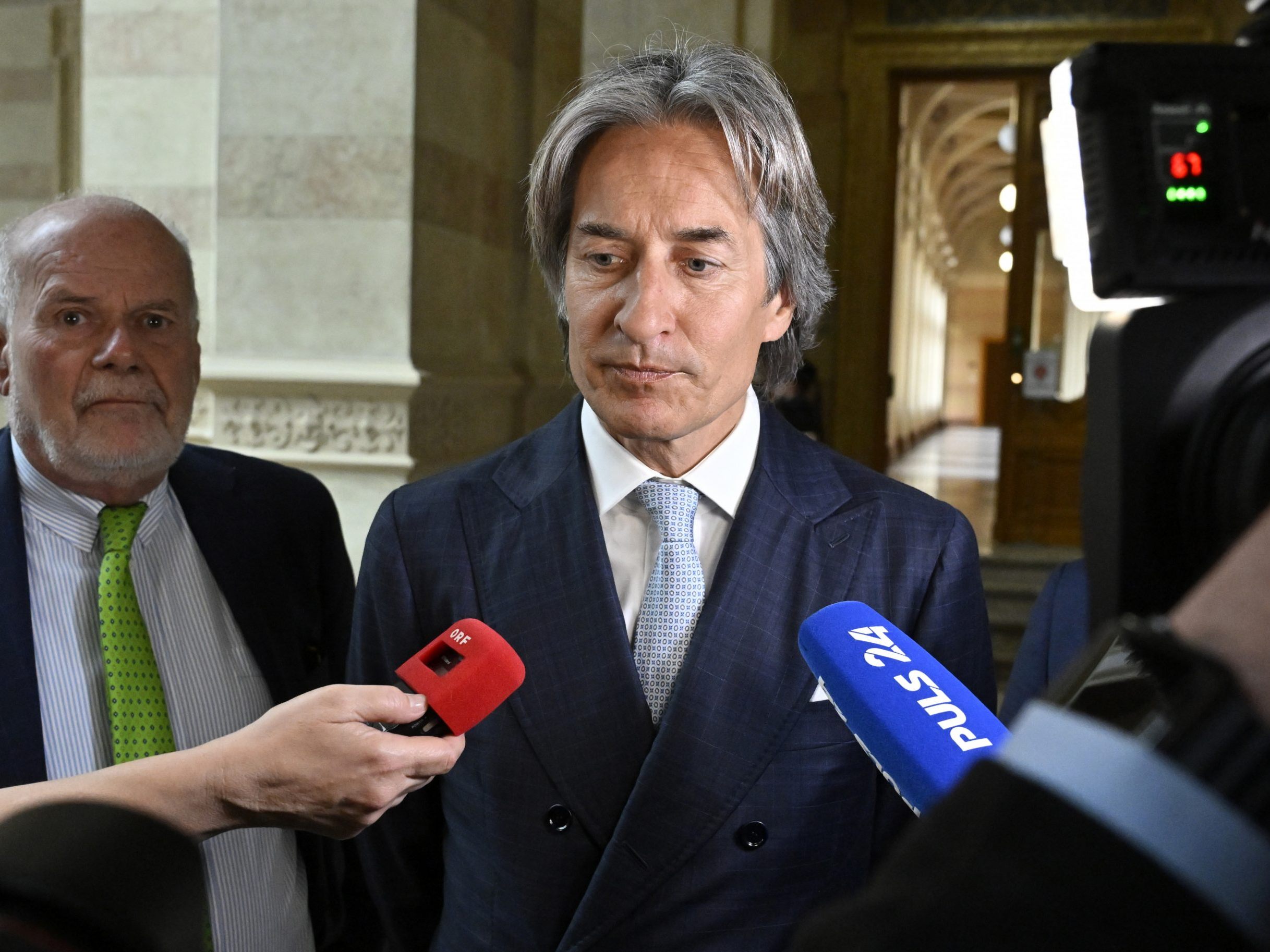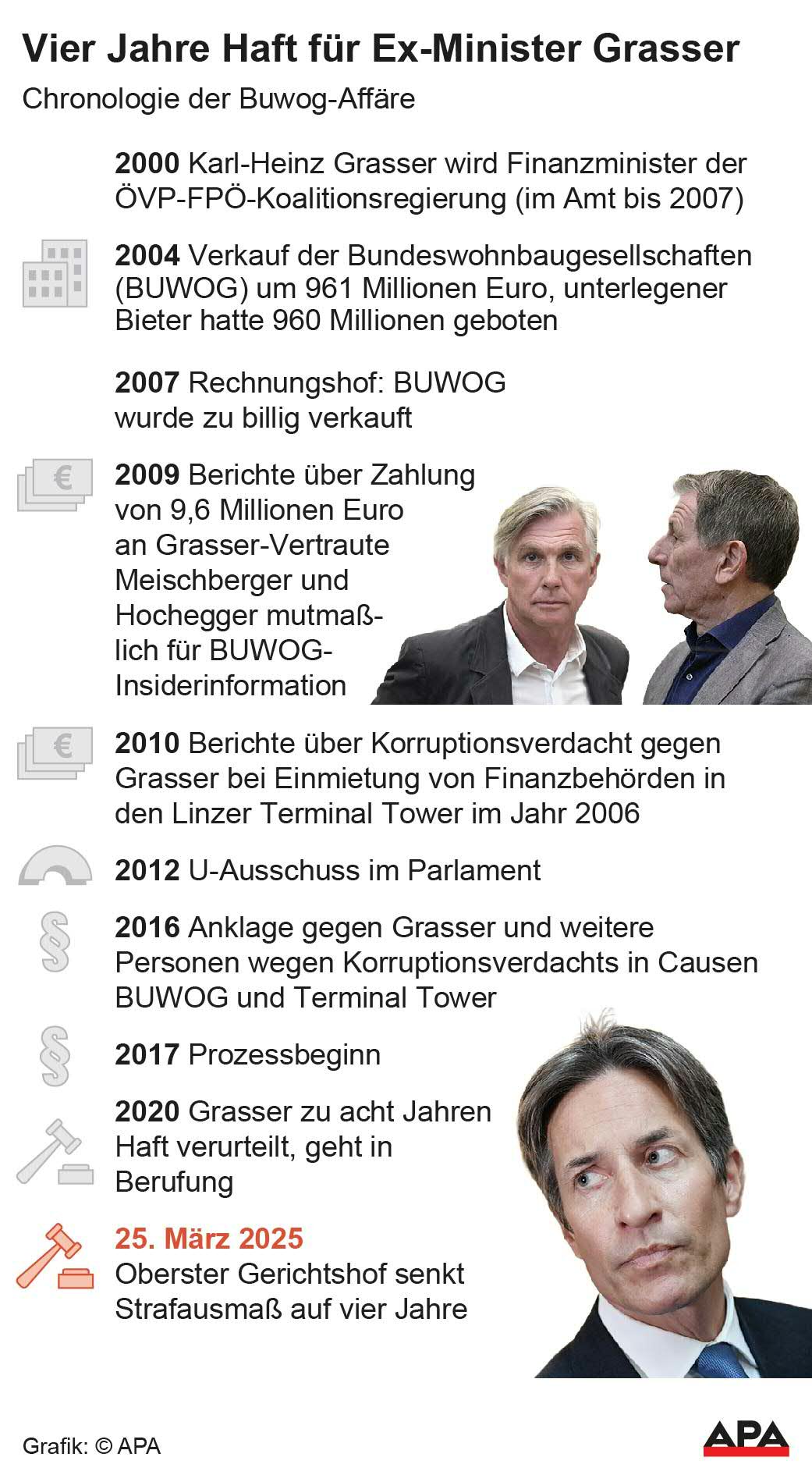OGH Reduces Prison Sentence for Grasser

The OGH reduced the prison sentence for former Finance Minister Karl-Heinz Grasser from eight to four years and for former FPÖ General Secretary Walter Meischberger from seven to three and a half years.
Grasser announced complaint to ECHR
Grasser and Meischberger spoke of a "misjudgment" after the verdict was announced and announced a complaint to the European Court of Human Rights (ECHR) in Strasbourg. "I have a very clear impression that the judges obviously wanted to convict me at any cost. I maintain that this verdict is unjust and, in my conviction, legally untenable," Grasser stated upon leaving the OGH courtroom on Tuesday. It was a "massive violation of my human rights and my life," said the former Finance Minister. "I am deeply convinced that I will at least get my rights at the European level."
OGH President Georg Kodek rejected Grasser's claims in "Zeit im Bild 2". The court had carefully and thoroughly dealt with the case, and the judge had explained why the alleged procedural errors did not exist. Asked whether it could be said that Grasser had lied for over a decade and a half or that an innocent man was convicted, Kodek said: "That is a permissible interpretation."
For former lobbyist Peter Hochegger, the five-member OGH panel halved the additional prison sentence from six to three years, with 2 years suspended. The convicted individuals will now receive a prompt request to begin their sentences. The Supreme Court reduced the additional prison sentence for former Immofinanz CEO Karl Petrikovics from two years to 12 months suspended, and for former RLB-OÖ board member Georg Starzer from 3 years partially suspended to 20 months suspended. Two other defendants were sentenced to suspended prison terms of 12 months and 8 months for money laundering, evidence falsification, and favoritism related to the incriminated facts. The conviction against Grasser for evidence falsification and the conviction against Hochegger for a criminal contribution to breach of trust in the Telekom Austria affair were overturned.
Today's decision by the OGH panel marks the conclusion of a real estate deal that has occupied the Republic for 21 years. At that time, around 60,000 federal apartments were sold for 961 million euros to a consortium around Immofinanz, while the losing bidder CA Immo had offered just 1 million euros less for the apartments. This caused surprise; however, it only became apparent a few years later that this privatization might have been rigged when it became known that two of Grasser's friends - the two former lobbyists Meischberger and Hochegger - had pocketed 9.6 million euros in commission from the Immofinanz deal.
Another complex issue in the proceedings was commission payments of 200,000 euros in connection with the leasing of the financial authorities in the Linz Terminal Tower. During the proceedings, further smaller charges related to the Telekom affair were included in the trial.
Investigation and trial duration had consequences
The halving of the sentences in the Grasser trial is essentially a result of the long investigation and trial duration of around 15 years. The previous good conduct and behavior since the acts in the Buwog and Terminal Tower Linz cases also had a mitigating effect, explained the chairwoman of the OGH judges' panel, Christa Hetlinger, regarding the sentence reduction. Additionally, the partial media prejudgment and public ridicule of the defendants had a mitigating effect.
The imposition of "significantly lower sentences" should by no means trivialize the acts, emphasized Hetlinger, the opposite is the case. The actions of the defendants involve serious corruption offenses with a damage amount of almost ten million euros. The chairwoman of the panel was particularly harsh on Grasser. That a finance minister personally enriched himself in such a manner is "unprecedented" in Austria. This would not have been expected in Austria and is likely to shake the public's trust in politics.
That the defendants exhausted their legal remedies and thus also contributed to a long trial duration should not be held against them. Exercising their rights should not be to their disadvantage, emphasized the OGH panel chairwoman. For the defendant ex-lobbyist Peter Hochegger, his confession was considered mitigating, and for the co-defendant ex-Immofinanz CEO Karl Petrikovics, significant damage compensation was considered.
"Defenders failed to demonstrate significant deficiencies because they do not exist"
The alleged procedural errors in the initial trial and a bias of the first judge Marion Hohenecker, extensively presented by the defense, do not exist, explained the OGH panel chairwoman. "The defenders failed to demonstrate significant deficiencies because they do not exist." There was no unfair trial. The defenders had repeatedly criticized the composition of the initial court under Judge Hohenecker as "not neutral" and "biased."
The OGH panel chairwoman extensively addressed the defense's allegations of bias against the first judge. The behavior of her husband, a judge, is not to be glossed over, but it is not part of the proceedings. The files do not provide any indications that Judge Hohenecker acted in a biased manner. The OGH judges' panel cannot identify any misconduct regarding the audio recordings in the large jury courtroom of the Vienna Criminal Court.

Hetlinger explained that she had the impression that the defendants believed the OGH would decide on guilt or innocence. However, that is not the case; the OGH is more concerned with whether the initial trial was conducted without deficiencies. The panel chairwoman noted that the defenders focused less on deficiencies and factual complaints and more on issues such as seating arrangements, live tickers, or audio recordings in the courtroom.
After almost exactly one and a half hours, OGH Judge Hetlinger finished her statements, and the private parties were referred to civil proceedings. The legally convicted must also pay damages. The OGH confirmed the private party award to the Republic of Austria concerning Grasser and Meischberger (9.8 million euros), Petrikovics (9.6 million euros), and another defendant (4.8 million euros). Thus, the largest corruption trial of the Second Republic came to an end.
(APA/Red)
This article has been automatically translated, read the original article here.





